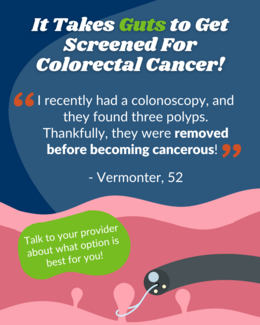Additional Information
The United States Preventive Services Task Force recommends screening for colorectal cancer in adults beginning at age 45 and continuing until age 75. You should talk to your provider about testing options, and which may be best for you.
The good news is that regular colorectal cancer screening can, in many cases, prevent colorectal cancer altogether by finding and removing polyps before they develop into cancer. Screening also provides an opportunity to find and treat cancers early, improving the chance for better outcomes.
In 2022, Vermont's colorectal cancer screening rate was 70% for 45–75 year-olds. This is higher than the national rate of 66%. However, there are differences in rate based on race, age and location. To learn more, visit the Cancer Surveillance and Reporting webpage and check the Vermont Cancer Data Pages.
In Vermont, colorectal cancer screening rates have remained steady since 2008, with no significant, measurable change in the percentage of Vermont adults ages 45–75 that have received screening. Colorectal cancer is the fourth most common cancer diagnosed in men and the fifth most common diagnosed in women in Vermont. It is the third leading cause of cancer death in both men and women in the state.


